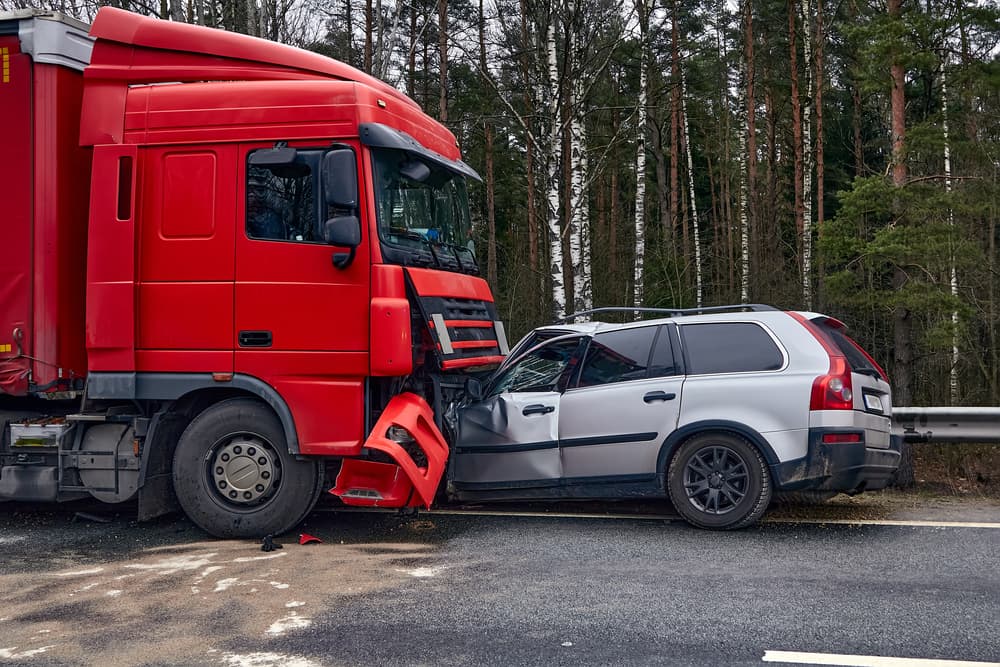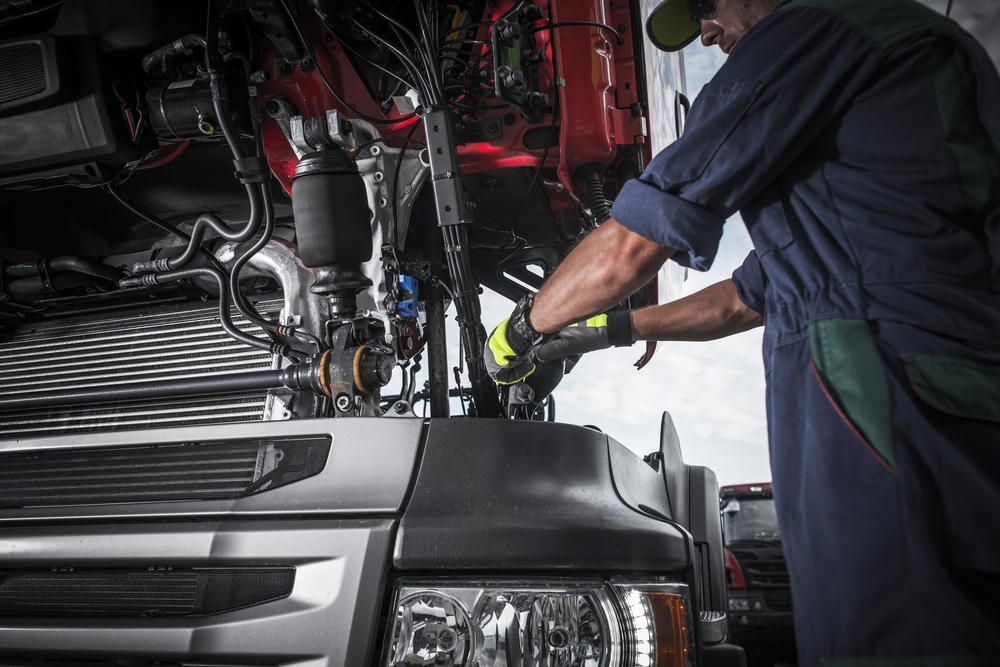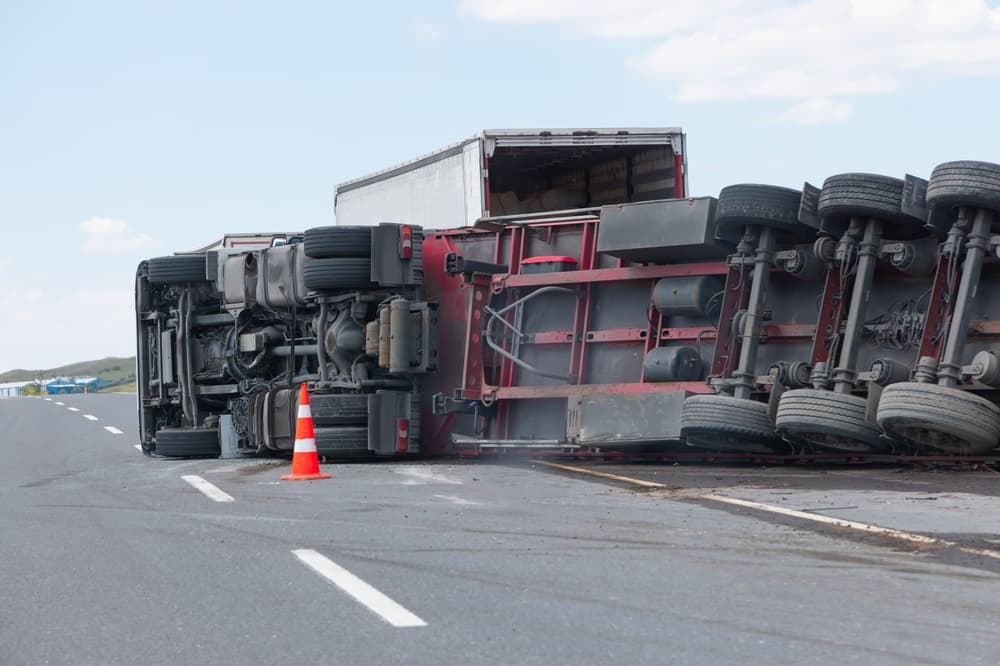Truck accidents can cause serious harm and damage, making it important for those impacted to understand liability issues. Our team of experienced truck accident attorneys is here to explore the key factors determining trucking companies' accountability in accidents.
Schedule A Consultation Today!
Is a Trucking Company Liable for Negligent Hiring and Training?
When we entrust trucking companies with the responsibility of transporting goods across our roads, we expect them to uphold the highest standards of safety and diligence. This expectation begins with the hiring and training of their drivers, a process that, if neglected, can have serious implications for road safety and liability in the event of an accident.
The Role of Thorough Background Checks
Hiring a truck driver should start with a comprehensive background check. This is not just about verifying the authenticity of a driver's commercial driver's license (CDL) but also about examining their driving record for any signs of recklessness, such as speeding tickets, DUI charges, or a history of accidents.
This step is important because it helps trucking companies weed out potential risks before they take the road under the company's banner. Ignoring red flags during the hiring process can be seen as negligent, especially if a driver with a problematic history is involved in an accident that may have been predictable based on their past behavior.
The Importance of Comprehensive and Ongoing Training
Once a company hires a driver, the trucking company's responsibility doesn't end with handing over the keys to a truck. Continuous training is crucial to ensuring drivers can navigate the challenges of the road safely. This training should cover defensive driving techniques and transporting hazardous materials to fatigue management and emergency response procedures.
However, training should not be a one-off event. The nature of driving and its regulations constantly evolve, requiring ongoing education to inform drivers of the latest safety protocols and legal requirements.
Tailoring training programs to address individual drivers' needs and weaknesses is essential. For example, additional focus on fatigue management can be beneficial if a driver struggles with managing long hours on the road. This personalized approach helps improve the safety of truck operations and shows a trucking company's commitment to its duty of care.
How Does Compliance with Federal Regulations Affect a Trucking Company's Liability?

For trucking companies operating across the United States, adhering to federal safety regulations is not just a matter of legal compliance—it's a critical component of ensuring the safety of both their drivers and the public. These regulations, established by the Federal Motor Carrier Safety Administration (FMCSA), cover a broad spectrum of operational aspects, from the maximum driving hours to strict requirements for vehicle maintenance and inspections.
But what if drivers overlook these rules, and how does this non-compliance impact a company's liability in the event of an accident? Our truck accident lawyers explain.
Key Federal Regulations
The FMCSA has set forth several key regulations designed to minimize risks and enhance safety on the road. Some of the most significant include:
- Hours of Service (HOS) Regulations: These rules limit the number of hours a driver can operate a vehicle in a given period to prevent fatigue. For instance, property-carrying drivers can only drive for up to 11 hours within a 14-hour window after having ten consecutive hours off duty.
- Vehicle Maintenance Standards: Trucking companies must maintain their vehicles in safe working conditions. Regular inspections, repairs, and maintenance must be documented and performed on critical components like brakes, tires, and lights.
- Driver Qualification Files: Companies must maintain detailed records for each driver, including their CDL, medical certifications, and proof of training on safety regulations and practices.
- Drug and Alcohol Testing: Drivers must undergo pre-employment drug testing and random, post-accident, reasonable suspicion, and return-to-duty testing to ensure they are not impaired while operating commercial vehicles.
The Impact of Non-Compliance on Liability
When trucking companies fail to comply with these and other FMCSA regulations, the consequences can extend far beyond federal fines and penalties. In the event of an accident, non-compliance can be a significant factor in determining liability.
Here's how:
- Exceeding HOS Limits: If investigators discover that a driver involved in an accident has exceeded the HOS limits, it can indicate that fatigue played a role in the incident. The company can be liable for not enforcing these rules, especially if electronic logging devices (ELDs) inadequately track driving hours.
- Neglecting Vehicle Maintenance: Accidents caused by mechanical failures, such as brake failures or tire blowouts, can directly point to a company's neglect in maintaining its fleet. This lack of maintenance can be seen as negligence, increasing the company's liability.
- Inadequate Driver Qualification: Employing drivers without proper licenses or medical certifications or who fail to conduct necessary background checks can lead to liability if the driver's qualifications (or lack thereof) contribute to an accident.
- Ignoring Drug and Alcohol Testing Protocols: If a driver in an accident tests positive for drugs or alcohol and the company does not adhere to testing requirements, this can significantly impact the company's defense and increase its liability for the accident.
How Important Are Maintenance and Inspections for Trucking Company Compliance and Safety?

The safety of commercial trucking operations hinges significantly on the regular maintenance and thorough inspections of their fleets. Ensuring the reliability and performance of the trucks is crucial and mandated by federal regulations to prevent accidents on the road.
The FMCSA sets forth specific requirements that trucking companies must follow to maintain their vehicles in a condition that ensures safety for the driver, the load, and the public. Our truck accident attorneys will explain exactly what these maintenance and inspection requirements are and how adherence to them impacts a trucking company's liability.
Federal Maintenance and Inspection Requirements
The FMCSA requires that all commercial motor vehicles (CMVs) undergo regular inspections, repairs, and maintenance to ensure they are in safe and proper working condition. These requirements include:
- Routine Vehicle Inspections: Trucking companies must conduct pre-trip and post-trip inspections for each vehicle. These inspections involve checking critical components such as brakes, steering mechanisms, lighting devices, tires, mirrors, and windshields to ensure they are in good working condition and comply with safety standards.
- Annual Inspections: Beyond daily checks, each CMV must pass an annual inspection conducted by a qualified inspector. This comprehensive review covers various vehicle components to certify that the truck is safe for operation. Companies are required to keep a record of these annual inspections.
- Maintenance Records: Trucking companies must maintain detailed records of all maintenance activities, inspections, and repairs performed on their vehicles. These records must include the date of the inspection or repair, the vehicle identification number, the type of inspection or repair, and the name of the person who performed the work. Keep these records for a specified period and make them available for review upon request by the FMCSA.
- Specific Component Maintenance: Certain vehicle components have explicit maintenance guidelines set by the FMCSA, such as brake systems, and regularly inspect, repair, or adjust the vehicles to meet safety standards.
The Impact of Neglecting Maintenance and Inspections
Failure to adhere to these maintenance and inspection requirements can have serious repercussions for a trucking company:
- Increased Liability in the Event of an Accident: If a mechanical failure due to poor maintenance contributes to an accident, the trucking company can be liable for negligence. This can result in significant legal and financial consequences, including compensation for damages and injuries caused by the accident.
- Federal Penalties: Non-compliance with FMCSA maintenance and inspection regulations can lead to fines and penalties, including the possibility of being declared unfit to operate.
- Impact on Safety Ratings: Regular maintenance and compliance with inspection requirements influence a company's safety rating. Poor maintenance practices can lead to lower safety ratings, affecting the company's reputation and ability to secure contracts.
How Do Proper Loading Practices Enhance Trucking Safety and Compliance?

Federal regulations, enforced by the FMCSA, establish specific guidelines for loading practices to prevent accidents caused by shifting or unsecured cargo. These regulations cover weight limits, cargo securing, and distribution, emphasizing the importance of adhering to these practices for safety and compliance. But what are these specific loading practices, and how do they contribute to trucking companies' safety and liability management?
Federal Regulations on Cargo Loading and Securing
The FMCSA's cargo loading and securing regulations ensure that cargo does not shift, fall, or become unsecured during transit, posing a safety risk. These guidelines include:
- Weight Limits and Distribution: Federal regulations dictate maximum weight limits for commercial vehicles, which depend on the number of axles and the vehicle's axle spacing. Adhering to these weight limits is crucial to prevent overloading, which affects a truck's handling and increases the risk of accidents. Equally important is the proper weight distribution; ensure even cargo distribution across the truck's trailer to maintain stability and prevent issues such as tipping or loss of control.
- Securing Devices: The FMCSA mandates securing cargo with appropriate devices, such as straps, chains, blocks, and braces, which must meet specific performance criteria. These securing devices are essential for keeping cargo in place, particularly when the truck is navigating turns, accelerating, or braking.
- Inspection and Adjustment: Drivers are required to inspect their cargo and its securing devices within the first 50 miles of a trip and make any necessary adjustments. Further inspections are required every three hours or 150 miles, whichever comes first, to ensure that the cargo remains securely fastened throughout the journey.
- Special Requirements for Specific Types of Cargo: Certain types of cargo, such as heavy equipment, logs, metal coils, concrete pipes, and automobiles, have additional specific securing requirements to address the unique challenges they present.
The Consequences of Improper Loading
Neglecting proper loading practices can have serious implications for trucking companies:
- Increased Accident Risk: Improperly loaded or unsecured cargo can shift, causing imbalance and potentially leading to accidents such as rollovers or loss of control. This affects not only the truck driver but also other road users.
- Liability Issues: In an accident caused by shifting or unsecured cargo, the trucking company can be liable for negligence. This can result in legal and financial repercussions, including damages for injuries and property loss.
- Regulatory Penalties: Non-compliance with FMCSA loading and securing regulations can lead to fines and penalties, impacting a company's operating authority and safety rating.
How Does Vicarious Liability Establish Trucking Company Responsibility for Driver Actions?
Vicarious liability is a legal principle that assigns responsibility to trucking companies for their drivers' actions during employment. Understanding this concept is central to holding trucking companies accountable for accidents, even when they have not directly contributed to the incident through their negligence.
Foundations of Vicarious Liability in Trucking
Vicarious liability, also known as "respondeat superior" (let the superior answer), is predicated on the employer-employee relationship. It acknowledges that employers, including trucking companies, benefit from their employees' work and thus should bear responsibility for the risks associated with that work.
Here's how it applies specifically to the trucking industry:
- Scope of Employment: For a trucking company to be held vicariously liable, the driver must have acted within the scope of their employment at the time of the accident. This includes all activities performed in the employer's service, from delivering cargo to driving between job sites. It does not cover actions taken by the driver for personal reasons outside of work hours.
- Benefit to the Employer: The principle also considers whether the driver's actions, even if improper, were performed for the company's benefit. For example, if a driver was speeding to meet a delivery deadline imposed by the employer, the company can be held responsible for any resulting accidents.
Implications of Vicarious Liability for Trucking Companies
The application of vicarious liability has several implications for trucking companies:
- Emphasis on Safety and Compliance: Knowing that they can be held liable for their drivers' actions, trucking companies have the incentive to implement and enforce comprehensive safety protocols, conduct thorough training programs, and ensure strict adherence to all relevant regulations. This includes everything from Hours of Service regulations to cargo loading standards and vehicle maintenance requirements.
- Hiring and Supervision Practices: Vicarious liability underscores the importance of careful hiring practices, including background checks and evaluations of driving records. Additionally, it highlights the need for ongoing supervision and monitoring of driver behavior to identify and correct potentially unsafe practices.
- Insurance Considerations: Trucking companies must maintain adequate insurance coverage, not just for their assets and operations but also to protect against liability arising from their drivers' actions. This coverage is essential for managing the financial risks associated with potential accidents and lawsuits.

Contact a Truck Accident Lawyer
If you've been involved in a truck accident, knowing your rights and the potential for holding a trucking company accountable is important. A skilled personal injury lawyer can provide the guidance and representation you need, ensuring you pursue the compensation you deserve.
Reach out to a truck accident lawyer today for a free case consultation.
